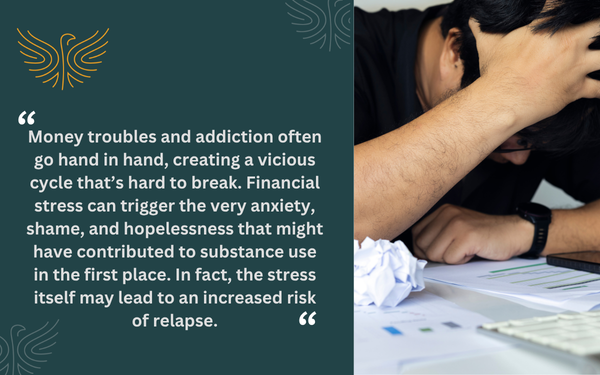Life after treatment is a beautiful, complex journey of rediscovery. You’re learning to navigate emotions without substances, rebuilding relationships, and finding your place in a world that kept moving while you focused on healing.
Amid these profound changes, finances can bring about varying degrees of stress. Many people underestimate the ongoing costs of recovery support—from therapy sessions and medications to sober housing and transportation to meetings. These expenses, while essential investments in your health, ultimately require proper planning and budgeting, as you would with any other living expense.
So, in this article, we dive into practical strategies for budgeting, maximizing insurance benefits, building savings, and creating a long-term financial plan that helps propel your recovery journey forward.
_______________________________________________________
Why Does Financial Planning Matter in Recovery?
Money troubles and addiction often go hand in hand, creating a vicious cycle that’s hard to break. Financial stress can trigger the very anxiety, shame, and hopelessness that might have contributed to substance use in the first place. In fact, the stress itself may lead to an increased risk of relapse.

Thus, building a stable financial foundation isn’t just about paying bills; it’s about creating space for recovery to flourish. When you’re not constantly worried about making rent or affording your next therapy session, you can focus your energy on the real work of recovery.
If you’re still struggling with the idea, it can help to think of budgeting not as a restriction, but as empowerment—a way to reclaim control over your life. Every dollar you allocate thoughtfully is a choice you’re making for your future self, a vote of confidence in your continued sobriety.
_______________________________________________________
What are the Costs of Ongoing Recovery Support?
Recovery doesn’t end when you leave treatment. In many ways, this is when the real work begins. And knowing the ongoing financial commitments helps you plan realistically and avoid surprises that could derail progress.
Typical ongoing recovery costs include:
- Therapy sessions: Individual therapy often costs $100–$200 per week, even with insurance co-pays. Group therapy tends to be more affordable but still adds up over time.
- Medication-Assisted Treatment (MAT): Monthly prescriptions can range from $50 to several hundred dollars, depending on medication type and insurance coverage.
- Sober living environments: Expect $500–$2,000 per month, varying by location, shared housing options, and included amenities.
- Transportation and meetings: Gas, public transit fares, or rideshares to support groups, therapy, or medical appointments can add up over time.
- Community and educational resources: Costs may include support group memberships, recovery literature, workshops, or retreats that reinforce your sobriety.
- Health insurance premiums: If you pay for coverage independently, premiums represent another significant recurring expense.
Creating a monthly and annual estimate of these costs empowers you to plan ahead and reduce your financial stress. Many of these expenses decrease over time as you move from intensive recovery to long-term maintenance, allowing you to budget with greater confidence. And they also can vary greatly from person to person since every individual’s recovery journey is different.
_______________________________________________________
How To Budget During Recovery
Creating a recovery-focused budget starts with an honest assessment. Track every dollar coming in and going out for at least a month. Use whatever method works for you—smartphone apps, spreadsheets, or good old-fashioned pen and paper.
Prioritize your expenses in order of importance: housing, food, treatment-related costs, then everything else. This hierarchy ensures that your basic needs and recovery support always come first.
Remember, your budget is a living document that should evolve with your recovery. Early sobriety requires more intensive (and expensive) support, yet later stages allow you to redirect funds toward other goals.
Exploring Insurance and Assistance Programs
In other good news, your health insurance might cover more than you realize. The Affordable Care Act (ACA) requires most plans to cover substance use disorder treatment, including ongoing therapy and medications. Medicaid also often provides comprehensive coverage for recovery services.
If you have employer-provided insurance, your plan likely includes Employee Assistance Program (EAP) benefits that offer free counseling sessions, which can also help.
Beyond traditional insurance, many communities have grants or nonprofit funds specifically for people in recovery. Some sober living facilities offer sliding-scale fees or scholarships.
Pharmaceutical companies often have patient assistance programs for expensive medications.
The key is asking for help early and often. Treatment centers, such as Freedom Recovery Center (FRC), ALSO typically have financial counselors who can help you navigate these systems.
Managing Debt and Rebuilding Credit
In recovery, unpaid bills, collection accounts, and damaged credit are common realities. Addressing these issues is part of your overall recovery process, but it doesn’t have to happen overnight.
Start by listing all debts and contacting creditors to arrange manageable payment plans. Many creditors will work with you if you’re honest about your situation and committed to repayment.
Prioritize high-interest debt while making minimum payments on everything else. Request free annual credit reports to understand your starting point, then monitor your progress quarterly.
Avoid the temptation of quick fixes like payday loans or predatory credit repair services. These often create more problems than they solve. Instead, seek reputable nonprofit credit counseling services that understand the intersection of recovery and financial rehabilitation.
Ongoing recovery, overall, requires commitment across all areas of life—emotional, physical, and yes, financial. Every small step you take toward financial wellness—whether it’s saving $10 this week, making that first call to a creditor, or simply tracking your expenses—is an act of self-care and self-respect.
Progress may feel slow, but momentum builds over time. And if you or a loved one needs help taking those very first steps forward toward recovery and relief, our team is here to help. Call us at 804-635-3746; the FRC team answers the phone 24/7. We’re ready to support you every step of the way.
.svg)






.svg)

.svg)



.svg)
